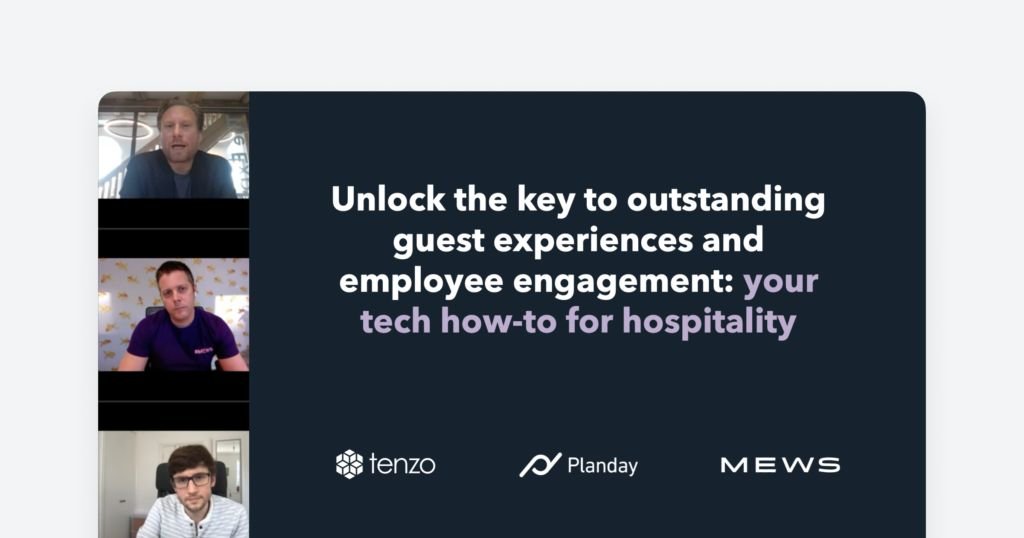
Article
5 min read
3 things hospitality businesses should do for a strong summer
Dom Hopkinson
Mar 19, 2021
Chapters
3 things hospitality businesses should do for a strong summer
News of accelerating vaccination programs and detailed Government re-opening plans have sent a surge of optimism through the hospitality and hotels sector. As businesses and their employees ready for a strong summer – backed up by a market of consumers busting to experience the best of restaurants, bars, cafes and hotels – what should hospitality operators do right now to set up for success?
Register to stream on demand
Get expert tips for your business right now by streaming this hospitality summit on demand. Join Planday CEO Christian Brøndum, Tenzo CEO Christian Mouysset and Mews CEO Matt Welle for the Institute of Hospitality‘s in-depth look at what your business should do for a strong summer.
As calendars flip past a year since the World Health Organisation declared the COVID-19 pandemic, consumers’ minds have turned to a world beyond lockdowns, shutdowns, restrictions and stay-at-home orders.
As – finally – COVID-19 news turns to something positive with a number of successful vaccines, Governments projecting a plan out of lockdown and some countries like New Zealand and Australia showing the possibility of “travel bubbles” and life as almost-normal in the tourism, hospitality and hotels sector, experts agree there is a strong potential for the market this summer.
So what should hospitality and hotel businesses do right now to capitalise on a strong and safe summer in 2021?

Planday CEO Christian Brøndum recently co-hosted a summit on hospitality and hotels this summer with London-based Tenzo CEO Christian Mouysset and Prague-based Mews CEO Matt Welle for the Institute of Hospitality. Set against the backdrop of palpable pent-up demand from consumers, the CEOs shared insights into the future of the experience economy, the expectations of consumers for digital tools and the business benefits of using data and digital tools to make your decisions.
Here’s a sneak peak of what they had to say.
COVID has made the case for digitalisation
Digitalisation and digital transformation are hardly new ideas in the hospitality and hotel sector. And while there was a general acceptance that digital tools and data-driven decisions are good for a business, the urgency in adapting to new tools and technologies was not there.
But the panel agreed that has changed.
“What has made the biggest impact on your digital transformation?” Mews CEO Matt Welle asks. “It’s COVID.”
So what does that change in your every day?
For businesses, Planday’s Christian Brøndum says, the power lies in bringing systems together.
“The real strength lies in bringing things together. Not just in terms of flexibility, but in the way you communicate with staff and with customers, and optimise your processes internally,” he says.
“The real questions to set a business up for success right now is how do you leverage IT across your business? How do you use different data points and integrate them to make better-informed decisions faster?
“Because that’s what we will have to do to come out of COVID together.”
And this has a flow-on effect to the way you run your business long term, including taking parts of the processes developed in the pandemic as permanent features in your operations.
“People have really got used to a very different world over the last year,” Tenzo’s CEO Christian Mouysset says.
“Obviously channels such as take-away and click and collect have really stepped up over the last year and – even when restaurants reopen – I don’t see that trend changing over the longer term.”
Your customers expect a digital experience
The panel also agreed that – after re-opening – digitalisation doesn’t stop at the front door.
Christian Mouysset says the pandemic has fundamentally changed the way businesses and their customers interact.
“Restaurants now have a 100 per cent, digital-only relationship with their customers,” he says.
“The only way you can get your food is by placing an order online and interacting with the restaurant using digital tools. And this will not change as we look forward”.
“So many restaurants have to use digital tools to react as soon as there is a change in an announcement from a Government or some sort of policy, because that’s how people are used to interacting now and it’s what your customers expect.”
Matt Welle agrees.
“We saw a surge in bookings in southern Europe as soon as the UK Government set out its re-opening road map and it looked like May 2021 was a possibility for travel to resume,” Matt says.
“Suddenly, hotels and businesses need to react and embrace technology to do things like e-learning and digital training because it’s not like you can gather everybody in person for a two-day meeting or training like you used to.”
Christian Brøndum says the lessons of the pandemic are that digital tools and technology can complement the operations of businesses that are people-driven.
“Imagine if you have all your data points together – about your inventory, your customers, your sales, your staff – and you brought them all together. Imagine it’s also available for the right staff to have that data at the right time for them to act and really improve and personalise the guest experience,” Christian Brøndum says.
“This isn’t about technology replacing the things that people do really well. It’s about using data and improving it.
“The hotelier who understands the guest’s needs, the waiter who knows the menu inside out and the person who makes the perfect cup of coffee. Using your data to complement these skills can really take your business to the next level.”
Your people make the difference
After a year of on-and-off lockdowns and restrictions, it is clear there is something special about the experience economy. Whether it’s an outstanding restaurant, a cool bar, charming pub or amazing hotel experience – it is something that just can’t be replicated at home.
(We know, a lot of us have tried!)
Much of that success is the outstanding service and craftsmanship that sets your experience with food, drink and hotels apart. And that’s all delivered thanks to people.
So as businesses like yours set up for a comeback for your people, as well as your guests, the panel had a few tips and tricks to keep in mind.
For Planday’s Christian Brøndum, it’s all about communication.
“How do we get staff engagement rates back up and make them feel comfortable so they can be their best?” he asks.
“First, think about the fact the place they are going back to will have changed. Guests will have different expectations.
“Retaining your best staff – your best asset – will be more important than ever. We know from surveys around the world that when staff leave, for 25 per cent of them, it’s because of communication and them not getting the information they need to do their jobs properly.
“Being aware of this and making sure you really focus on communicating well with your staff so they can do their job will be so important.
“Even within the Planday communication feature, we are really starting to see communication spike as employers update the people in their business about things like re-opening plans, so that’s a really positive sign.”
Mews’ Matt Welle urges employers to embrace e-learning.
“You are going to see this massive spike in hotel occupancy at the time when markets reopen and travel is allowed again in many places,” Matt says.
“That’s why we have scaled up our knowledge centre and e-learning, because there’s this rush for training as people start to come back online and re-engage again.
“With e-learning and pre-recorded training you can really quickly bring people back into the workforce. So being prepared for that as an employer is so important.”
Tenzo’s Christian Mouysset urges businesses to think of flexibility as fundamental to running your business.
“Given the staff will not have been working their usual patterns – or in some cases not at all – there is an element of re-training. There will be a lot of systems or procedures that will have changed,” Christian Mouysset says.
“Employers will also have to be aware of and sensitive to the fact that it’s going to be very different.
“Many restaurants pre-pandemic were not doing delivery services or click-and-collect. And on a really practical level, people have not been working as much so they are going to have to re-develop routines to get back into it.
“It’s employers’ job to help ease people back into this.”
Get the full picture
This is just a snippet of the full insights of the post-COVID experiences your staff and your guests want and expect.
Register below to watch the whole conversation, including the data points your business needs right now and tips and tricks to look after your people and take your hospitality business to the next level.
